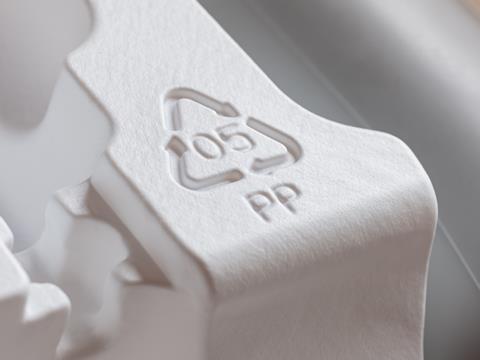
Bostik is joining the push for food- and INRT-grade recycled polypropylene sourced from post-consumer packaging waste as the 50th participant in Nextek’s NEXTLOOPP project.
Polypropylene is said to be one of the least recycled polymers at 3-5% due to its use in non-bottle packaging like pots, tubs, and trays – despite reaching a market share of around 20% in 2018.
The NEXTLOOPP project utilizes cutting-edge marker technology PolyPPRISM to identify and separate food-grade polypropylene from other plastics in the stream, including butter tubs, yoghurt pots, coffee pouches, and detergent bottles.
The polymer is then decontaminated with PPristine technology to ensure its compliance with food-grade standards in the UK, EU, and USA. This transforms the material back into food-grade recyclates for use in new polypropylene packaging.
NEXTLOOPP is also intended to produce INRT-grade polypropylene, which is designed for packaging that requires no odour and no migration challenges. Its fifty participants are working together to trial and develop its cleaning, sorting, and decontamination technologies as it gears up for commercial-scale implementation. Brand owners, suppliers, universities, industry associations, and end-users are all involved in the project.
Professor Edward Kosior, founder and CEO of Nextek Ltd and NEXTLOOPP, says: “Bostik’s commitment to help build a more sustainable world, in this instance by improving recycling stream effectiveness, resonates with NEXTLOOPP’s objective to ensure every aspect of packaging design is as sustainable as possible. Adhesives play a fundamental role in recycling, as glue residues can’t be filtered out and must be completely removed from the pack.
“Bostik offers high-tech solutions to avoid glues leaching into recycled plastics, and we are delighted to welcome Bostik’s extensive expertise in adhesives to solve these challenges.”
“We appreciate the opportunity to participate in NEXTLOOPP and support its overall objective to demonstrate circular recycling for PP food trays,” adds Eric Parois, Bostik’s global market director for Label and Narrow Web Technologies. “In particular, because it is focused on PP, NEXTLOOPP complements what we are working on for PET and HDPE circular recycling, providing us with a new avenue to explore how Bostik laminating adhesives, seal and reseal PP tray lidding adhesives and PP tray wash-off label adhesives can bring forward 100% recyclable solutions as we work together to decrease virgin plastic consumption.”
Nextek’s NEXTLOOPP project was the overall winner of the Sustainability Awards 2021. Since then, it has welcomed Albéa Cosmetics & Fragrance into its mission; and worked alongside TOMRA to apply fluorescent markers to MCC Verstraete’s In Mold Labels (IML) – hoping to commercialize its PolyPPRISM sorting technology.
Meanwhile, Nextek’s COtooCLEAN recycling solution for flexible films has been nominated under the pre-commercialized Driving the Circular Economy category at this year’s Sustainability Awards.
If you liked this article, you might also enjoy:
The L’Oréal approach to packaging sustainability
What steps is Apple taking to make its packaging more sustainable?
How did Brazil achieve its 100% aluminium can recycling rate – and can it be replicated in the EU?
Experts have their say on the EU’s Packaging and Packaging Waste Directive revisions
Also, if you’re interested in packaging sustainability, you will want to attend our Sustainable Packaging Summit in Amsterdam on 14-15 November. The Summit brings together leaders and pioneers from across the industry to align strategically, learn, network, and create a critical mass to accelerate change. You can learn more by clicking here, and you can buy a ticket to attend here.


















No comments yet